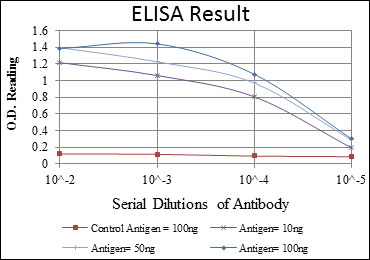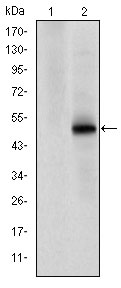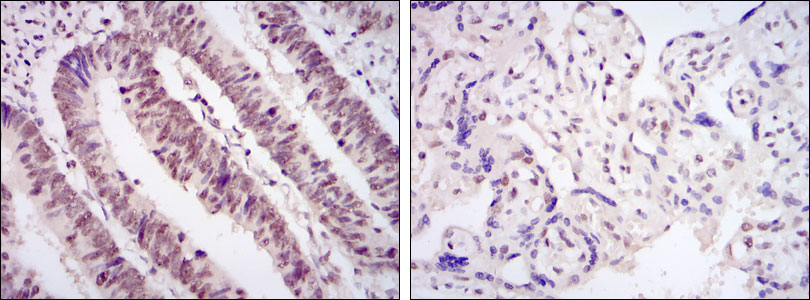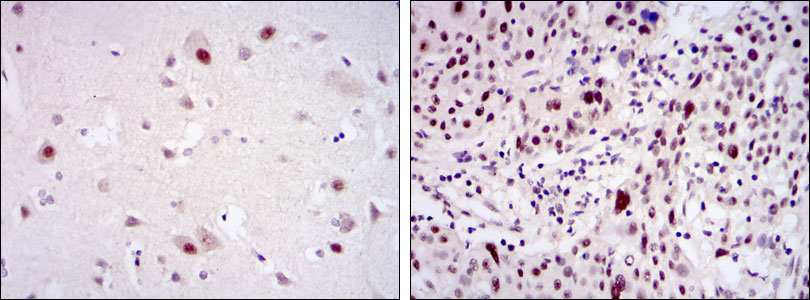CDK9 Antibody
Purified Mouse Monoclonal Antibody
- SPECIFICATION
- CITATIONS
- PROTOCOLS
- BACKGROUND

Application
| WB, IHC, E |
|---|---|
| Primary Accession | P50750 |
| Reactivity | Human |
| Host | Mouse |
| Clonality | Monoclonal |
| Clone Names | 1B5A7 |
| Isotype | IgG1 |
| Calculated MW | 43kDa |
| Description | The protein encoded by this gene is a member of the cyclin-dependent protein kinase (CDK) family. CDK family members are highly similar to the gene products of S. cerevisiae cdc28, and S. pombe cdc2, and known as important cell cycle regulators. This kinase was found to be a component of the multiprotein complex TAK/P-TEFb, which is an elongation factor for RNA polymerase II-directed transcription and functions by phosphorylating the C-terminal domain of the largest subunit of RNA polymerase II. This protein forms a complex with and is regulated by its regulatory subunit cyclin T or cyclin K. HIV-1 Tat protein was found to interact with this protein and cyclin T, which suggested a possible involvement of this protein in AIDS. (provided by RefSeq)Tissue specificity: Ubiquitous. |
| Immunogen | Purified recombinant fragment of human CDK9 expressed in E. Coli. |
| Formulation | Ascitic fluid containing 0.03% sodium azide. |
| Gene ID | 1025 |
|---|---|
| Other Names | Cyclin-dependent kinase 9, 2.7.11.22, 2.7.11.23, C-2K, Cell division cycle 2-like protein kinase 4, Cell division protein kinase 9, Serine/threonine-protein kinase PITALRE, Tat-associated kinase complex catalytic subunit, CDK9, CDC2L4, TAK |
| Dilution | E~~1/10000 WB~~1/500 - 1/2000 IHC~~1/200 - 1/1000 |
| Storage | Maintain refrigerated at 2-8°C for up to 6 months. For long term storage store at -20°C in small aliquots to prevent freeze-thaw cycles. |
| Precautions | CDK9 Antibody is for research use only and not for use in diagnostic or therapeutic procedures. |
| Name | CDK9 {ECO:0000303|PubMed:10903437, ECO:0000312|HGNC:HGNC:1780} |
|---|---|
| Function | Protein kinase involved in the regulation of transcription (PubMed:10574912, PubMed:10757782, PubMed:11145967, PubMed:11575923, PubMed:11809800, PubMed:11884399, PubMed:14701750, PubMed:16109376, PubMed:16109377, PubMed:20930849, PubMed:28426094, PubMed:29335245). Member of the cyclin-dependent kinase pair (CDK9/cyclin-T) complex, also called positive transcription elongation factor b (P-TEFb), which facilitates the transition from abortive to productive elongation by phosphorylating the CTD (C-terminal domain) of the large subunit of RNA polymerase II (RNAP II) POLR2A, SUPT5H and RDBP (PubMed:10574912, PubMed:10757782, PubMed:11145967, PubMed:11575923, PubMed:11809800, PubMed:11884399, PubMed:14701750, PubMed:16109376, PubMed:16109377, PubMed:20930849, PubMed:28426094, PubMed:30134174). This complex is inactive when in the 7SK snRNP complex form (PubMed:10574912, PubMed:10757782, PubMed:11145967, PubMed:11575923, PubMed:11809800, PubMed:11884399, PubMed:14701750, PubMed:16109376, PubMed:16109377, PubMed:20930849, PubMed:28426094). Phosphorylates EP300, MYOD1, RPB1/POLR2A and AR and the negative elongation factors DSIF and NELFE (PubMed:9857195, PubMed:10912001, PubMed:11112772, PubMed:12037670, PubMed:20081228, PubMed:20980437, PubMed:21127351). Regulates cytokine inducible transcription networks by facilitating promoter recognition of target transcription factors (e.g. TNF-inducible RELA/p65 activation and IL-6-inducible STAT3 signaling) (PubMed:17956865, PubMed:18362169). Promotes RNA synthesis in genetic programs for cell growth, differentiation and viral pathogenesis (PubMed:10393184, PubMed:11112772). P-TEFb is also involved in cotranscriptional histone modification, mRNA processing and mRNA export (PubMed:15564463, PubMed:19575011, PubMed:19844166). Modulates a complex network of chromatin modifications including histone H2B monoubiquitination (H2Bub1), H3 lysine 4 trimethylation (H3K4me3) and H3K36me3; integrates phosphorylation during transcription with chromatin modifications to control co-transcriptional histone mRNA processing (PubMed:15564463, PubMed:19575011, PubMed:19844166). The CDK9/cyclin-K complex has also a kinase activity towards CTD of RNAP II and can substitute for CDK9/cyclin-T P-TEFb in vitro (PubMed:21127351). Replication stress response protein; the CDK9/cyclin-K complex is required for genome integrity maintenance, by promoting cell cycle recovery from replication arrest and limiting single-stranded DNA amount in response to replication stress, thus reducing the breakdown of stalled replication forks and avoiding DNA damage (PubMed:20493174). In addition, probable function in DNA repair of isoform 2 via interaction with KU70/XRCC6 (PubMed:20493174). Promotes cardiac myocyte enlargement (PubMed:20081228). RPB1/POLR2A phosphorylation on 'Ser-2' in CTD activates transcription (PubMed:21127351). AR phosphorylation modulates AR transcription factor promoter selectivity and cell growth. DSIF and NELF phosphorylation promotes transcription by inhibiting their negative effect (PubMed:9857195, PubMed:10912001, PubMed:11112772). The phosphorylation of MYOD1 enhances its transcriptional activity and thus promotes muscle differentiation (PubMed:12037670). Catalyzes phosphorylation of KAT5, promoting KAT5 recruitment to chromatin and histone acetyltransferase activity (PubMed:29335245). |
| Cellular Location | Nucleus. Cytoplasm. Nucleus, PML body. Note=Accumulates on chromatin in response to replication stress Complexed with CCNT1 in nuclear speckles, but uncomplexed form in the cytoplasm. The translocation from nucleus to cytoplasm is XPO1/CRM1- dependent. Associates with PML body when acetylated |
| Tissue Location | Ubiquitous. |

Thousands of laboratories across the world have published research that depended on the performance of antibodies from Abcepta to advance their research. Check out links to articles that cite our products in major peer-reviewed journals, organized by research category.
info@abcepta.com, and receive a free "I Love Antibodies" mug.
Provided below are standard protocols that you may find useful for product applications.
References
1. J Biol Chem. 2008 Mar 21;283(12):7368-78. 2. Mol Cell Biol. 2008 Apr;28(7):2201-12.
If you have used an Abcepta product and would like to share how it has performed, please click on the "Submit Review" button and provide the requested information. Our staff will examine and post your review and contact you if needed.
If you have any additional inquiries please email technical services at tech@abcepta.com.













 Foundational characteristics of cancer include proliferation, angiogenesis, migration, evasion of apoptosis, and cellular immortality. Find key markers for these cellular processes and antibodies to detect them.
Foundational characteristics of cancer include proliferation, angiogenesis, migration, evasion of apoptosis, and cellular immortality. Find key markers for these cellular processes and antibodies to detect them. The SUMOplot™ Analysis Program predicts and scores sumoylation sites in your protein. SUMOylation is a post-translational modification involved in various cellular processes, such as nuclear-cytosolic transport, transcriptional regulation, apoptosis, protein stability, response to stress, and progression through the cell cycle.
The SUMOplot™ Analysis Program predicts and scores sumoylation sites in your protein. SUMOylation is a post-translational modification involved in various cellular processes, such as nuclear-cytosolic transport, transcriptional regulation, apoptosis, protein stability, response to stress, and progression through the cell cycle. The Autophagy Receptor Motif Plotter predicts and scores autophagy receptor binding sites in your protein. Identifying proteins connected to this pathway is critical to understanding the role of autophagy in physiological as well as pathological processes such as development, differentiation, neurodegenerative diseases, stress, infection, and cancer.
The Autophagy Receptor Motif Plotter predicts and scores autophagy receptor binding sites in your protein. Identifying proteins connected to this pathway is critical to understanding the role of autophagy in physiological as well as pathological processes such as development, differentiation, neurodegenerative diseases, stress, infection, and cancer.





